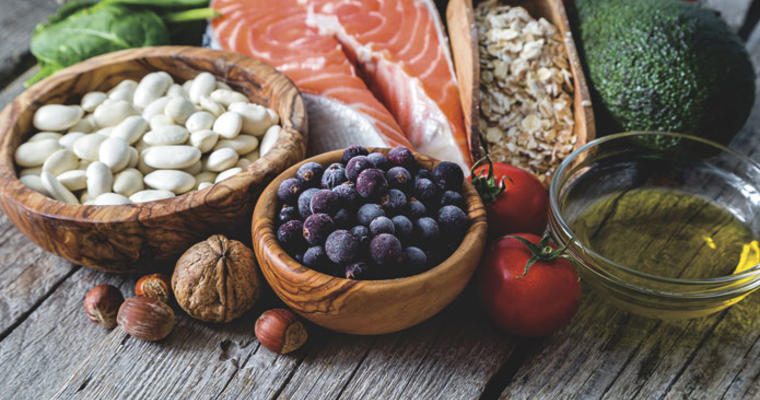It’s no secret that what we put into our bodies promotes healthy living, whether it’s reducing the risk of obesity, heart disease, diabetes or any number of concerns. The right foods also might work wonders for our brains, although there’s no perfect prescription for maintaining a sharp mind as we age.
We all know good nutrition is fundamental for the well-being of people living with dementia. But are there foods that can delay, if not prevent, memory-care problems? Perhaps.
Better blood flow, better brain
The same foods that promote blood flow to the heart also benefit blood flow to the brain, according to the Academy of Nutrition and Dietetics (AND). These general health benefits are at the foundation of a couple of popular diets, such as the DASH (Dietary Approaches to Stop Hypertension) Diet and the Mediterranean Diet. Their proven ability to lower certain health risks has led to a diet that is a combination of the two—the MIND Diet, which stands for Mediterranean-DASH Intervention for Neurodegenerative Delay—and it focuses on improving cognition.
Each diet includes foods good for the brain: produce, fish, whole grains, berries and foods with healthy fats. The MIND Diet, however, emphasizes only foods believed to benefit the brain. Each diet also lists foods to avoid: red meats, butter and stick margarine, cheese, pastries and sweets, fried food and fast food. Among the foods favored by every diet:
Vegetables. All vegetables are good, but cruciferous vegetables—broccoli, cauliflower, cabbage and dark leafy greens (kale, collard greens)—may improve memory.
Berries. The MIND Diet specifically includes blueberries as a potent brain-protecting food. Other diets list dark berries (blackberries, cherries and strawberries) because of their antioxidants: anthocyanins and flavonoids.
Omega-3 fatty acids. Abundant in many types of fish as well as olive oil, flax seed oil, chia seeds and soybeans, omega-3 foods improve cardiovascular health and blood flow.
Nuts. Walnuts and almonds, as well as seeds and legumes may improve working memory, and the DASH Diet recommends three to six servings a week.
Many choices for many needs
Although some diets are very strict and some offer a bit more flexibility, there’s a lot of variety when it comes to brain foods. Since there’s no proven way to cure dementia, this provides options when deciding what works best for the people in your care who are living with (or at risk of developing) memory-care issues, says Dana Fillmore, Gordon Food Service Healthcare Segment Manager.
“Choices are always available,” she says. “It’s important for food and nutrition-services teams to make the right food options available and help residents understand why certain choices are beneficial.”
Studies continue to show the impact of brain foods on memory. A study by Alzheimer’s & Dementia: The Journal of the Alzheimer’s Association says strict adherence to the MIND Diet lowered the risk of Alzheimer’s by 53 percent. More studies will be done, Fillmore says. In the meantime, it’s clear focus on good nutrition choices is vital to improving your overall well-being.
Fuel for thought
Depending on the diet, different foods are believed to reduce the risk of dementia and Alzheimer’s disease. These dishes, featured in our Spring 2017 issue of Foodservice Pulse, are packed with brain-healthy ingredients:
Farro and Asparagus Salad
Brain foods: Farro, asparagus, onions, carrots, celery, baby field greens, almonds, olive oil
Roasted Vegetables on Quinoa
Brain foods: Broccoli, cauliflower, yellow squash, carrots, celery, olive oil
Chicken Thighs White Bean Hash
Brain foods: Chicken, kale, grape tomatoes, navy beans, yellow bell peppers, Brussels sprouts
Seared Chicken Marsala
Brain foods: Chicken, crimini mushrooms, eggplant, cauliflower, leeks, red peppers
Herbed Salmon
Brain foods: Salmon, carrots, farro, fennel, spinach, crimini mushrooms
Everything Crusted Cod
Brain foods: Cod, red onions, eggs, artichokes, olive oil











